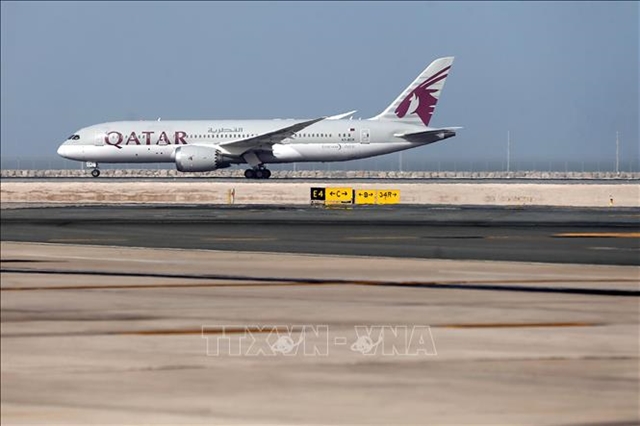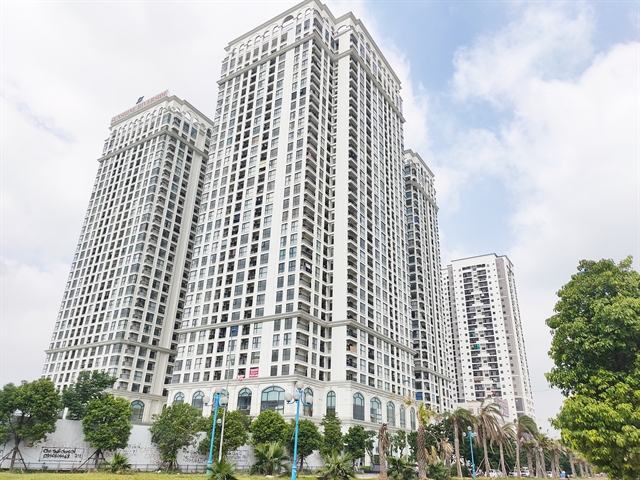 Economy
Economy

The Hà Nội condominium market had lower new supply volume in the third quarter of this year (Q3 2020), while the sold units have exceeded new launches, according to CBRE Vietnam's report on the Hà Nội property market in Q3 2020.

|
| Photo shows an apartment complex near Nhật Tân Bridge in Hà Nội. VNS Photo Đoàn Tùng |
HÀ NỘI The Hà Nội condominium market had lower new supply volume in the third quarter of this year (Q3 2020), while the sold units have exceeded new launches, according to CBRE Vietnam's report on the Hà Nội property market in Q3 2020.
In Q3 2020, there were about 3,500 units launched in Hà Nội leading to a total new launch during the first nine months of this year of around 10,700 units – down 61 per cent year on year (y-o-y).
In terms of segments, there were only mid-end and affordable products launched in Q3 2020 with relatively comparable shares to total new launches of 51 per cent and 49 per cent, respectively. Most projects launched during this quarter are small to medium projects located outside Ring Road No 3.
Meanwhile, about 4,200 apartments were sold during the quarter, 20 per cent higher than the new launch volume, although there were some delays in sales and marketing activities due to the second wave of COVID-19 in late July and early August.
Selling prices in the primary market in Q3 2020 averaged US$1,325 per sq.m (excluding VAT and maintenance fees), down by 4 per cent y-o-y due to the higher share of new launches in the affordable segment.
Moving forwards, the level of new launches is expected to hover at around 14,000 - 16,000 units in 2020, allowing sales absorption to catch up. The primary pricing is forecast to remain flat in Q4 2020 since new supply is heavily dominated by the mid-end segment and higher competition in this segment.
Nguyễn Hoài An, director of Hà Nội Branch, CBRE Vietnam, said: “The Hà Nội condominium market has been heavily dominated by local, Hà Nội-based developers. We expect this to change in the near future, as an increasing number of foreign developers, and Vietnamese Southern based developers are expected to invest in new projects in Hà Nội.”
Also affected by the second wave of COVID-19, the landed property market recorded only 45 new units launched in the third quarter.
As of the first nine months of 2020, the number of newly launched units is only 326, down 92 per cent compared with last year.
The sales performance in this segment was still positive, recording 570 units, approximately 30 per cent higher than the number of new launches in the period due to the limited new supply and positive demand.
Because of low new supply, the market paid more attention to existing projects. The growth in the secondary prices for villas and terraced houses was illustrated at 2 per cent and 7.2 per cent respectively compared to last year.
The secondary prices continued to increase in the developed locations such as Thanh Xuân, Bắc Từ Liêm, Nam Từ Liêm, Cầu Giấy and Tây Hồ. Those areas also witnessed the completion of infrastructure projects and amenities recently.
It is expected that the new supply for landed property market will be limited to 500 - 600 units for the whole year.
In the following years, the market is expected to further expand to new areas such as Đan Phượng and Đông Anh (Hà Nội) or Văn Giang (Hưng Yên, a neighbouring province of Hà Nội).
Office, retail markets
In this report, CBRE said the performance of Hà Nội's office market continued to struggle from the second wave of COVID-19, as certain tenants further contracted their office space.
Vacancy rates of Grade A offices surged to 24.1 per cent due to the combined impact of COVID-19 and major new supply, up by 16.5 percentage points (ppts) quarter on quarter (q-o-q) and 16.2 ppts y-o-y. Vacancy rates of Grade B projects also rose to 11.5 per cent as at Q3 2020, up by 0.5 ppts q-o-q and 2.4 ppts y-o-y.
In Q3 2020, the Hà Nội office market welcomed around 93,000 sq.m of new office space, with the opening of Capital Place. This market is expected to welcome a large future pipeline, with more than 50,000 sq.m in Q4 2020 and more than 220,000 sq.m in 2021.
Meanwhile, in the Hà Nội retail market, the vacancy rate in the central business districts (CBD) jumped to 11.05 per cent, up 10.33 ppts q-o-q and 9.71 per cent y-o-y despite the advantage of location and limited new supply.
This was the first quarter in eight years, shopping malls in the CBDs saw such a high vacancy rate. Rents on the first floor, however, remained unchanged as vacant space was mostly on the upper floors of the shopping centres.
Rents in non-CBD locations also recorded a drop of 1.5 per cent y-o-y and 0.78 per cent q-o-q, averaging US$24.53/sq.m/month, down 1.5 per cent y-o-y and 0.78 per cent q-o-q. Vacancy rates remained at a high level and tended to increase, reaching 11.15 per cent, up 1.37 ppts q-o-q and 2.93 ppts y-o-y.
In terms of supply, the Hà Nội market did not record any new projects coming into operation in the first nine months of 2020. Retail property areas remained unchanged at more than one million sq.m.
As most tenants experienced challenges during this tough time, many landlords offered financial support such as rent free periods, reduced rents, or rental rebates. While some others, including some shophouse owners, have been reluctant to offer such programmes, rather leaving the units vacant.
Therefore, it is not uncommon to see ongoing vacant and closed shops on major streets in Hà Nội, more than six months into the outbreak of COVID-19 to the capital city. VNS




